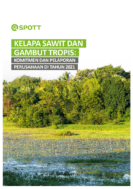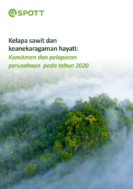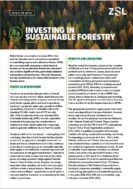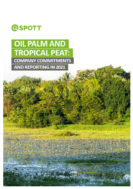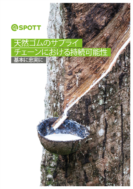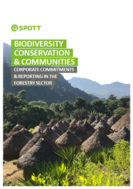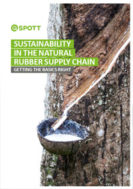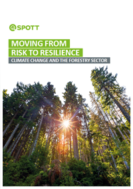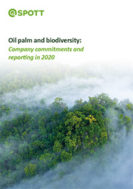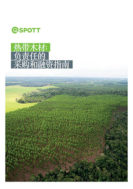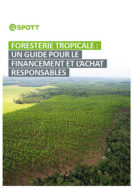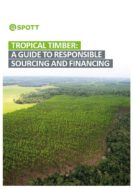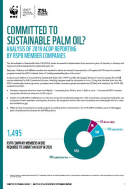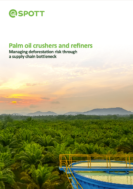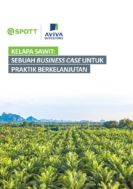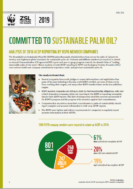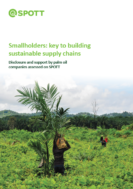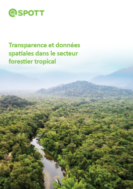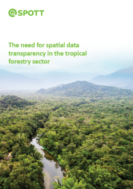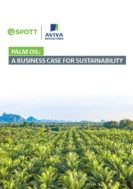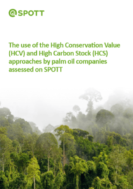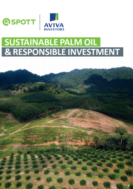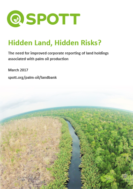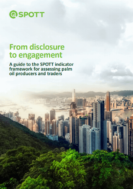Download our recent reports and publications for further information about SPOTT and sustainable commodity production.
-
Laporan ini membahas peran penting lahan gabut tropis, ekosistem kaya yang krusial bagi keanekaragaman hayati dan regulasi iklim, mengacu pada temuan utama analisis data dari penilaian SPOTT ZSL tahun 2021 terhadap 100 produsen, pengolah, dan pedagang minyak kelapa sawit. Mengingat dampak lingkungan dan sosial kritis yang terkait dengan pengrusakan gambut, sangat penting bagi perusahaan minyak kelapa sawit untuk bekerja dalam meminimalkan risiko gambut di dan sekitar perkebunan atau pemasok mereka. Laporan ini memberikan seperangkat rekomendasi untuk produsen, pembeli hilir, bank, dan investor minyak kelapa sawit.
-
Produksi minyak kelapa sawit yang tidak berkelanjutan berperan besar dalam hilangnya keanekaragaman hayati di hutan tropis, dan hal ini harus menjadi area fokus bagi industri dan pemangku kepentingan untuk diperbaiki. Laporan ini mengacu pada data dari penilaian SPOTT di tahun 2020 terhadap 100 produsen, pengolah dan pedagang minyak kelapa sawit, untuk memberikan gambaran tentang pengungkapan komitmen dan perkembangan perusahaan dalam perlindungan keanekaragaman hayati.
-
ZSL’s latest investor brief on timber and pulp offers a compelling look into the opportunities and risks associated with forestry investments. The brief provides valuable insights into key considerations for responsible investors in the forestry sector and highlights the importance of maintaining natural capital while seeking additional returns. It examines industry trends and the use of remote sensing and digital traceability systems.
-
This report looks at the vital role of tropical peatlands, rich ecosystems crucial for biodiversity climate regulation, drawing on key findings of the analysis of data from ZSL SPOTT’s 2021 assessments of 100 palm oil producers, processors and traders, looking at key environmental, social and governance (ESG) issues.
-
このレポートは、天然ゴム産業における ESG リスク評価を知らせることを目的としており、この分野における重大な環境的および社会的変化に焦点を当てています。このレポートは、15 の天然ゴム生産者および加工業者に対する ZSL SPOTT の 2021 年の評価からのデータを利用して、ESG 指標に関するコミットメントと進捗状況の開示の概要を提供します。
-
This report looks at the potential for the timber and pulp sector to contribute to securing IPLC rights in forest production landscapes, drawing on key findings of the analysis of data from ZSL SPOTT’s 2021 assessments of 100 timber and paper producers, processors and traders, looking at key environmental, social and governance (ESG) issues.
-
This report aims to inform ESG risk assessments in the natural rubber industry and highlights the significant environmental and social changes in the sector. The report draws on data from ZSL SPOTT’s 2021 assessments of 15 natural rubber producers and processors, to provide an overview of their disclosure of commitments and progress on ESG indicators.
-
This report aims to inform risk assessments in the forestry sector and provide guidance on how to approach creating a risk assessment. The report draws on data from ZSL SPOTT’s 2021 assessments of 100 timber and pulp producers, processors and traders, to provide an overview of their disclosure of commitments and progress on climate change.
-
Unsustainable palm oil production plays a significant role in biodiversity loss in tropical forests, and this must be a focus area for both the industry and its stakeholders to remedy. This report draws on data from the 2020 SPOTT assessments of 100 palm oil producers, processors and traders, to provide an overview of their disclosure of commitments and progress on biodiversity protection and includes recommendations for supply chain actors.
-
热带木材: 负责任的 采购和融资指南
2021
如果不开展可持续经营,木材和纸浆的生产会带来相当大的ESG风险。
-
Ce rapport de ZSL fournit une introduction aux problèmes environnementaux, sociaux et de gouvernance associés aux bois tropicaux pour les institutions financières et les acheteurs de produits bois.
-
This report from ZSL provides an introduction to the environmental, social and governance issues associated with tropical timber for financial institutions and buyers of timber products.
-
The Roundtable on Sustainable Palm Oil (RSPO) unites thousands of stakeholders from across the palm oil industry to develop and implement global standards for sustainable palm oil.
Each year, Ordinary and Affiliate members are required to submit an Annual Communication of Progress (ACOP) report to measure progress towards the RSPO’s shared vision of “making sustainable palm oil the norm”.
In this second edition of ‘Committed to Sustainable Palm Oil?’, WWF and ZSL (Zoological Society of London) analyse the ACOP reports submitted by RSPO members in 2020, detailing progress made by companies in 2019.
-
Palm oil crushers and refiners are key nodes in a complex supply chain, and their central role places them in a position of significant leverage, and responsibility, to drive sustainability in the sector. Effective implementation of zero-deforestation commitments requires supply chain traceability to plantation, as well as processes in place to support and monitor supplier compliance.
This report provides an overview of the zero-deforestation commitments made by these companies, their level of traceability and supplier engagement, and highlights the risks and recommendations for improvement.
-
The Roundtable on Sustainable Palm Oil (RSPO) unites thousands of stakeholders from across the palm oil industry to develop and implement global standards for sustainable palm oil. Ordinary and Affiliate members are required to submit an Annual Communication of Progress (ACOP) report each year to gauge progress towards the shared vision of “making sustainable palm oil the norm”. But an analysis of 2018 ACOP reporting by WWF and ZSL casts serious doubt over company commitments to produce, trade, and purchase sustainable palm oil.
-
Approximately 40% of the world’s palm oil is produced by smallholder farmers, making them essential parts of global palm oil supply chains. To help make sustainable palm oil the norm, it is crucial that smallholders are incorporated into company sourcing strategies and have access to sufficient technical and financial support to produce palm oil sustainably.
This report from ZSL finds that there is a lack of disclosure by palm oil producers and traders on both the extent and locations of smallholders within their supply chains. Knowing where companies source from is critical to effectively implement and verify compliance with corporate commitments and legal requirements. Providing support and training to both independent and scheme smallholders can help companies ensure that the palm oil they source is produced in compliance with their policies.
To transform the palm oil sector, companies must extend their commitments to cover all their sourcing, disclose details of the smallholders in their supply chain, and increase support for the smallholders they source from.
-
Du tracé des chaînes d’approvisionnement complexes impliquant de nombreuses entreprises multinationales au suivi des activités des entreprises productrices sur le terrain, les données spatiales permettent de comprendre les facteurs de dégradation des forêts et de la perte de biodiversité.
La transparence dans le secteur forestier, notamment des données spatiales adéquates et publiques concernant les activités des entreprises, peut jouer un rôle clé en facilitant le suivi des activités forestières, en permettant une meilleure compréhension de l’impact des chaînes d’approvisionnement, et ainsi en rendant le secteur plus durable.
Ce rapport présente un argumentaire pour la publication de données spatiales par les entreprises forestières. Il fournit des orientations concernant la collection, la publication et l’utilisation de ces données. Enfin, il met en évidence les bénéfices de la transparence en matière de données spatiales pour les entreprises et leurs parties prenantes, y compris les institutions financières et clients, qui ont besoin d’informations exactes, cohérentes, et transparentes afin d’éclairer leurs décisions de prêt, d’investissement et d’achat.
-
From the mapping of complex supply chains across multinational companies through to local level monitoring of activities in the field, spatial data is a key tool to improve our understanding of drivers of forest degradation and biodiversity loss.
Transparency in the forestry sector – including publicly available and suitable spatial data about company operations – can play a key role in facilitating improved monitoring of forestry activities, increasing knowledge of supply chain impacts, and ultimately strengthening sustainability in the forestry sector.
This report from ZSL presents the case for spatial data disclosure by forestry companies. It provides guidance on the collection, disclosure and use of spatial data. It highlights the benefits of spatial data transparency to companies and wider stakeholders, including financial institutions and buying companies, who rely on accurate, consistent and transparent information to support their lending, investment and procurement decisions.
-
To investigate the business case for producing, sourcing and financing sustainable palm oil, ZSL commissioned an analysis of SPOTT assessment scores and financial performance data. This analysis is presented in Palm oil: a business case for sustainability by ZSL in conjunction with Aviva Investors.
The report makes a clear argument for companies to urgently change their practices and for the whole sector to push for sustainability. It is aimed at producers, buyers and investors seeking to understand the financial and business-based arguments for addressing the environmental, social and governance (ESG) impacts of unsustainable palm oil production.
-
The High Conservation Value (HCV) and High Carbon Stock (HCS) approaches to land-use planning are used to identify and protect important environmental and social values that need to be conserved. These approaches are of great importance to companies’ approaches to conservation in general. They also contribute to risk reduction, the implementation of commitments to no deforestation, reducing greenhouse gas emissions, and safeguarding the rights of local communities.
This report from ZSL finds that over 70% of palm oil producers and traders assessed on SPOTT in November 2017 had made clear commitments to the HCV approach, increasing from 54% in October 2015. But despite this progress, only a third of companies clearly extend their HCV commitments to scheme smallholders and independent suppliers, indicating potential ESG risks.
-
This report from Aviva Investors and ZSL’s dedicated SPOTT team highlights that investors have the power to transform the whole palm oil industry, by encouraging the companies they finance to adopt more responsible policies on deforestation, land conflicts and labour conditions.
Focusing on the palm oil investment case through case studies, it outlines key questions that institutional investors should ask during their engagement with oil palm growers, traders and buyers, to help incentivise improvements to their environmental, social and governance (ESG) practices.
-
Palm oil companies are entrusted as stewards of vast areas of land, yet transparency around land holdings is poor. The lack of corporate reporting on the full extent and locations of land under a company’s management inhibits accountability and masks environmental and social risks.
This report provides an analysis of company-reported data on land holdings to identify gaps and inconsistencies in figures and to highlight recommendations for companies, their investors and other stakeholders.
-
There is an ever-growing spotlight on the risks associated with sourcing palm oil and investing in its production. What information should palm oil producers and traders be disclosing to their stakeholders? What are the most pressing environmental, social and governance (ESG) issues for investors?
The comprehensive SPOTT framework of 125 transparency indicators for best practice in palm oil production highlights the potential financial, reputational and other risks facing responsible investors, buyers and wider stakeholders.
To support disclosure and engagement on these issues, ZSL has collaborated with palm oil companies, investors, banks, buyers, and other organisations to publish this detailed guide.

